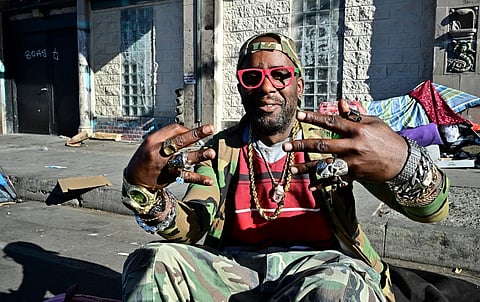
- NEWS
- the EDIT
- COMMENTARY
- BUSINESS
- LIFE
- SHOW
- ACTION
- GLOBAL GOALS
- SNAPS
- DYARYO TIRADA
- MORE

California has become the epicenter of the homelessness crisis in the US. Here are a few facts to explain the challenging situation in the Golden State.
California has 30 percent of the country's homeless population, according to recent government statistics. That is far more than big states like New York (with 13 percent) and Florida (5 percent).
Large California cities including San Francisco and Sacramento each have thousands of homeless, but the situation is far worse in the county of Los Angeles, with 75,500 of the state's 171,000 homeless.
A bigger factor even than poverty, mental health, and addiction, experts say, is a housing shortage that has driven prices to exorbitant levels.
For years, too few housing units have been built in the state, owing to complex environmental rules, planning regulations that favor individual homes over multi-family units, and restrictive covenants that limit the construction of low-cost housing.
Thus, the poorest city in the country — Detroit, Michigan — has a much smaller homeless problem because affordable housing there is abundant.
A common stereotype holds that California's homeless problem is fueled by the in-migration of poor people from other states attracted by the warm climate or a permissive attitude toward drugs.
But 90 percent of the homeless people surveyed recently in the state had homes in California before ending up in the street, said Margot Kushel, who heads the Center for Vulnerable Populations at the University of California at San Francisco.
Of those living alone, 47 percent were aged 50 or above. And 41 percent of that group had never been homeless before turning 50.
"These are people who haven't been given access to healthcare their whole life, who've worked very physically demanding jobs, and… are often just vulnerable," Kushel said.
Homelessness and the building of affordable housing are the top concerns of Californians — far ahead of inflation, immigration, abortion, and climate change, according to a Quinnipiac University survey in March.
Republicans gleefully say California suffers from out-of-control progressive values.
This has been a challenge for Governor Gavin Newsom, a politically ambitious Democrat, who frequently points to the millions of dollars his administration has spent on the problem.
Kushel said federal intervention may be needed: A bipartisan program to help homeless military veterans has reduced their numbers by 55 percent since 2010.
